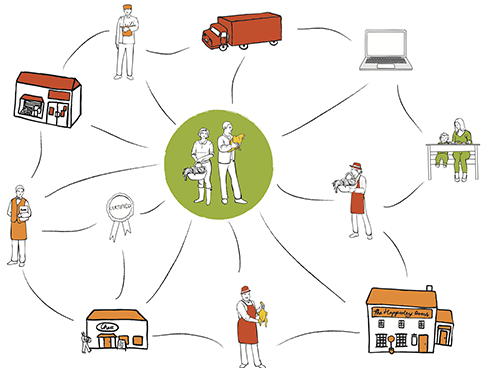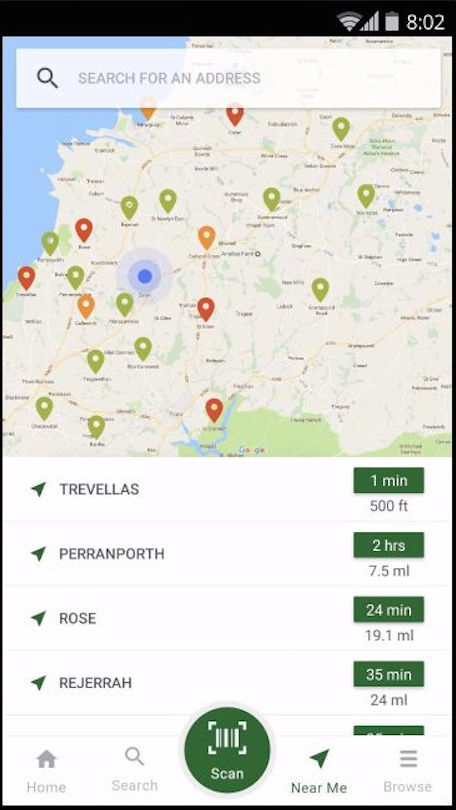Our Software Director (Dragos, pictured above in his garden), and our Comms Manager, Alan, explain.
Extensive research has been conducted into the food purchasing habits of Millennial consumers. These studies have shown that transparency and traceability are a reccurring topic at the forefront of the data collected, with a generation of consumers putting pressure on food suppliers to provide honest information about the origins of their products and the techniques involved in creating them.
Understandably, this has also become a hot topic in the boardroom meetings of “Big Food” corporations. In the past, the clamor of consumers asking tough questions was stifled by a simple rethinking of marketing tactics. Often these new campaigns could be incredibly misleading, creating a pastoral and serene illusion of quaint family farms supplying a big friendly machine.
But research shows that consumers have seen the proverbial puppet strings and are now showing a more focused and educated interest in unearthing the cold hard facts about the locality, environmental impact, and sustainability of their food purchases, while creating a growing demand for big business food producers to get real.
Enter Happerley: a company pairing innovative blockchain technology with an extensive network of food producers, intermediaries, and retailers that will provide public access, traceability, and full transparency to the UK’s food supply chains at all levels.
Boots on the Ground
Happerley Founder and farmer, Matthew Rymer, is no stranger to watching fast-money food companies misrepresent provenance to collect the premiums owed to the hard-working people with their Wellie’s planted in the soil. By developing Happerley he is hoping to level the playing field for those struggling at the bottom of the supply chain, arguably the most crucial link, by instantly connecting them to the consumer holding their product in their hands.
While Rymer isn’t the first to notice this widening gap between field and fork, he is the first to sound the rallying cry to businesses, farms, intermediaries, and retailers in the UK to come together under one banner of proving and protecting the provenance, truly a food movement that reflects reports claiming consumers are more likely to purchase from a primary source they can verify than a brand they cannot.
Rymer explains:
"Happerley is currently identifying, certifying and publishing the supply networks for food businesses across the UK - creating one transparent network. We are involving all businesses that value provenance and with nothing to hide - whether an egg producer, a fish wholesaler, a brewery or a restaurant. Next year. following the pilots with Midcounties Co-op, we will open up Passporting as an option to participating food businesses, empowering the primary producer to passport their provenance and, by validating through the participating chain, empowering the consumer to see the whole journey in an instant. So, first the chains, then the food. One network - then one truth."

How Passporting Works
At a local butcher shop, a leg of lamb with a Happerley Passport QR code is scanned with the Happerley smartphone app. Instantly the app scours the Blockchain to verify where the lamb was born, raised, and slaughtered-regardless of whether or not these took place the same place. Additional information about where it grazed or what it was fed will will provide applicable links to the feed suppliers, and then their suppliers of feed ingredients, and so on. It will identify where the lamb was processed and packaged, and when and how it was shipped, and by whom.
Importantly, the Passport information on a product expires after an allotted time has passed, so that the customer can be certain of the freshness of a product, a feature that is certain to be useful in restaurants and catering applications.
Happerley’s Software Director, Dragos Perca, sums up the blockchain technology:
“Personal computers all over the world are used to store highly encrypted data, or “blocks”. There is no single company or organization that regulates or controls these computers, they are simply interconnected and distributed throughout a massive network, called the blockchain. All of the computers within the blockchain store the exact same data.”
He continues:
“The blockchain offers immutability, meaning once information is saved it cannot be altered. It has some limits for certain applications, but it provides confidence that historical transactions cannot be tampered with.”
The blockchain is transparent by nature because it is not owned or controlled by anyone. Rather it is an open network that can be viewed by all at any time. Goods or currency can freely flow between two parties because there is no middle man to handle the processing or charge a fee. A ledger is the only information encrypted within a block with verification from the network assuring a transaction took place.
Happerley has focused this technology on tracking the multitudes of transactions that occur within the food supply network. By harnessing the blockchain public data, Happerley’s app is able to follow the transaction history of goods backwards to their primary source. A type of high-tech paper trail can connect the dots between farmers, growers, processors, packagers, shippers, and retailers, and all within seconds.
 Geo-location will tell you who owns the cattle in a field or the apple in an orchard and where you can purchase them- effectively reversing the flow of information in the supply chain from the soil upwards.
Geo-location will tell you who owns the cattle in a field or the apple in an orchard and where you can purchase them- effectively reversing the flow of information in the supply chain from the soil upwards.
Happerley Ever After
By pledging to provide this information from a neutral platform without any agenda, Happerley is pushing the decision to-buy or not-to-buy in the hands of the consumer, a power in its own right. What is truly innovative is that in the same exact instant Happerley empowers the primary providers by directly including them in the transaction, a process that fell to by the wayside long before farmer’s markets included stalls selling fidget-spinners.
This type of all-inclusive information, and the access to it, has never before been available to consumers in this medium. Happerley hopes to take advantage of the shift towards this new paradigm in technology by feeding energy back into the symbiotic relationship between the field and the fork and letting consumers tap into however and whenever they would like.
Alan Leizerman